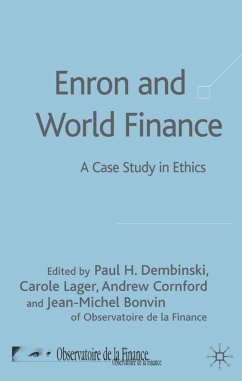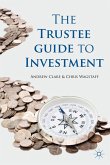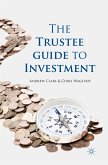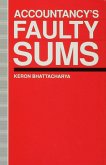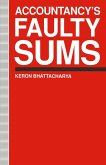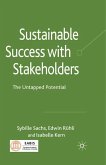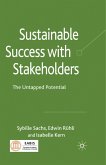Four years after the debacle, the term 'Enron' has earned its place in the everyday vocabulary of business ethics. Hardly anyone understands the business intricacies of what really happened with the sophisticated energy conglomerate. Even fewer are those able to envision, beyond the business case, the ethical questions and dilemmas facing actors at any one stage of the drama. Using the collapse of Enron as a case study, this book not only shows how and where ethics came into play, but also draws lessons and discusses possible remedies that may prevent the whole financial system from falling apart as a result of either excessive greed or over-regulation.
'The essays in this book greatly enhance our understanding of the causes of one of the most important events in financial history. The authors examine in notable depth the ethical and governance dimensions of the Enron saga, while providing a fascinating commentary on the nature of modern finance capitalism.' - John Plender, Financial Times and author of Going off the Rail - Global Capital and the Crisis of Legitimacy
'Enron and World Finance addresses the most important issue of our time...This brilliant collection of essays with its remarkably insightful introduction and conclusion require us to consider what might be called the tyranny of economics...Enron is important not only in itself but also as a warning signal of the predictable destructive consequences of the failure of language.' - Robert A. G. Monks, Lens Governance Advisors, USA
'Enron offers an 'ideal' example of using or perhaps misusing financial innovations within modern corporations. The book Enron and World Finance provides a very insightful overview of this memorable case where the ethical dimension of an organization is nonexistent. As professors of Finance, we welcome such a book that illustrates the pitfalls of financial creativity when it ignores or abuses the boundaries of an honest corporate culture and of its management.' - Marc Chesney and Rajna Gibson, Professors of Finance, Swiss Banking Institute, University of Zürich, Switzerland
'The book provides, at once, afresh understanding of the place of ethical thought in financial markets, and a focus on leadership and responsibility for the implementation of ethical duties. I commend this fascinating book to a wide readership in financial and academic institutions.' - Professor Dr. Hans Tietmeyer, Bundesbankprasident i.R., Germany
'Enron and World Finance addresses the most important issue of our time...This brilliant collection of essays with its remarkably insightful introduction and conclusion require us to consider what might be called the tyranny of economics...Enron is important not only in itself but also as a warning signal of the predictable destructive consequences of the failure of language.' - Robert A. G. Monks, Lens Governance Advisors, USA
'Enron offers an 'ideal' example of using or perhaps misusing financial innovations within modern corporations. The book Enron and World Finance provides a very insightful overview of this memorable case where the ethical dimension of an organization is nonexistent. As professors of Finance, we welcome such a book that illustrates the pitfalls of financial creativity when it ignores or abuses the boundaries of an honest corporate culture and of its management.' - Marc Chesney and Rajna Gibson, Professors of Finance, Swiss Banking Institute, University of Zürich, Switzerland
'The book provides, at once, afresh understanding of the place of ethical thought in financial markets, and a focus on leadership and responsibility for the implementation of ethical duties. I commend this fascinating book to a wide readership in financial and academic institutions.' - Professor Dr. Hans Tietmeyer, Bundesbankprasident i.R., Germany

